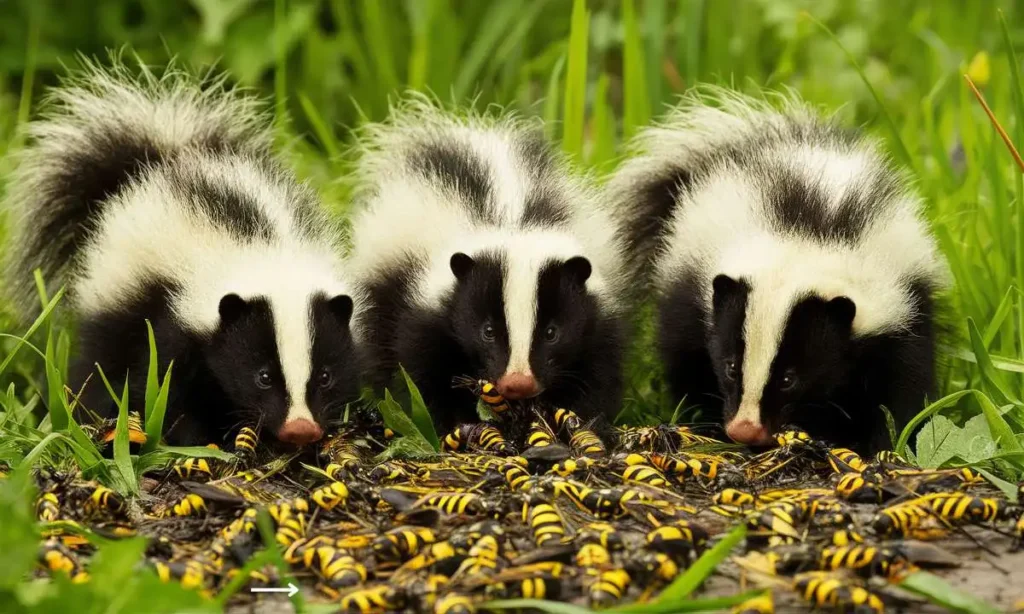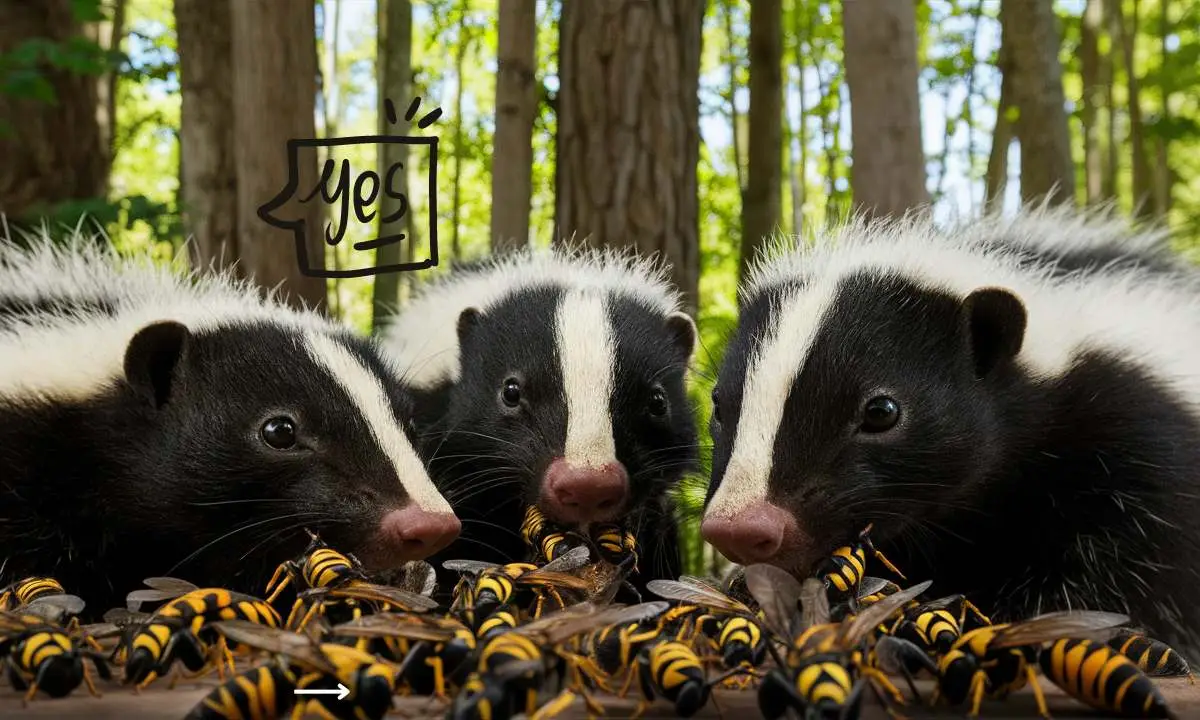Can Skunks Consume Wasps?
Last updated on November 4th, 2024 at 06:44 am
Yes, skunks do eat wasps and their larvae as part of their diet. From my experiences as a skunk pet owner and wildlife lover, I can tell you that skunks have a surprisingly varied diet. They might dig into wasp nests, eating the insects without a second thought! If you want to understand how skunks contribute to controlling wasp populations and what makes them such adaptable feeders, you’re in the right place.
Wasps As Prey
Skunks are curious animals, and they often explore new foods. Wasps, with their stinging abilities, might seem like dangerous prey. Yet, skunks still eat them. This shows how bold skunks can be in their diet choices. The idea of wasps as prey brings up many questions. How do skunks manage to eat wasps without getting hurt? Let’s dive into the world of skunk and wasp interactions.
Skunk And Wasp Interaction
Skunks and wasps meet more often than we think. Skunks are nocturnal, searching for food at night. Wasps usually rest during this time, making them easy targets. But, wasps can sting, right? Skunks have thick fur that protects them from stings. They can dig into wasp nests without much worry. Here’s what happens:
- Skunks find a wasp nest – often on the ground or in low bushes.
- They dig it out – using their strong claws.
- Skunks eat the wasps and larvae – enjoying a protein-rich meal.
| Skunk Action | Wasp Response |
|---|---|
| Dig into the nest | Try to sting |
| Eat wasps/larvae | Defensive, but often overpowered |
Most wasps can’t defend their nests against a skunk’s attack. Skunks have a unique way of eating that allows them to enjoy their meal with minimal risk.
Wasps As Potential Prey
Wasps might not seem like the best meal choice. Yet, they offer skunks important nutrients. Wasps are rich in proteins and fats, crucial for a skunk’s diet. Eating wasps is part of the skunk’s natural behavior. It helps them survive and thrive in the wild. Here’s why skunks target wasps:
- Easy to find – Wasps nests are common in skunk habitats.
- Nutritious – Wasps provide a good source of protein and fat.
- Minimal risk – Skunks’ fur protects them from stings.
Skunks use their senses to locate wasp nests. Once found, they quickly dig them out and eat the inhabitants. This might seem dangerous, but skunks are well-equipped for the task. Their actions show how adapted they are to their environment, making the most of the resources available to them.
Defense Mechanisms
In the wild, creatures often cross paths, leading to the question: Do skunks eat wasps? While skunks are known for their diverse diet, including insects, wasps can be on their menu. But what’s fascinating is how these animals use their defense mechanisms to protect themselves. Both skunks and wasps have unique ways to ward off predators. Let’s dive into the world of skunk and wasp defenses to see how these creatures survive in the wild.
Skunk Defense
Skunks are notorious for their powerful defense strategy. They possess a specialized gland that can spray a foul-smelling liquid to deter predators. This liquid can cause irritation and even temporary blindness. Here are some key points about skunk defense:
- Chemical Spray: Their spray can reach up to 10 feet, keeping predators at a safe distance.
- Warning Signs: Skunks will often give a warning by stomping their feet, hissing, and raising their tail before spraying.
- Accuracy: They have the ability to aim their spray with remarkable accuracy.
Skunks’ spray is made of thiols, compounds that contain sulfur, which is responsible for the spray’s strong odor. This defense is so effective that most animals recognize the skunk’s black and white coloring and avoid them. See the table below for a breakdown of the skunk’s defense arsenal:
| Defense Mechanism | Description |
|---|---|
| Chemical Spray | A foul odor that can reach predators up to 10 feet away. |
| Visual Warning | Distinctive black and white coloring acts as a natural warning sign. |
| Physical Actions | Stomping, hissing, and tail raising serve as pre-spray alerts. |
Wasp Defense
Wasps, on the other hand, have a different approach to defense. Their main weapon is their painful sting. Wasps can sting multiple times, unlike bees. Here are some important aspects of wasp defense:
- Stinger: Wasps use a sharp stinger to inject venom into their target.
- Aggressive Behavior: They can be very aggressive if they feel their nest is threatened.
- Phenomenal Flyers: Wasps are excellent at flying, which helps them escape danger quickly.
The venom from a wasp sting contains chemicals that cause pain and deter predators. Wasps also use their bold yellow and black stripes as a visual warning to potential threats. Below is a table summarizing the wasp’s defense mechanisms:
| Defense Mechanism | Description |
|---|---|
| Sting | A sharp stinger that can deliver multiple doses of venom. |
| Warning Coloration | Bold stripes signal to stay away. |
| Mobility | Quick flight abilities allow for swift retreats. |
Impact On Ecosystem

Do skunks eat wasps? Yes, they do. This eating habit of skunks plays a big role in our ecosystem. Skunks help by eating wasps and other pests. This keeps the pest numbers down. It helps our gardens and farms. Let’s dive deeper into how skunks impact our ecosystem.
Role In Controlling Pest Population
Skunks are like nature’s pest control. They eat wasps, bees, and other insects. This helps in a few ways:
- Less pests: With skunks around, there are fewer wasps. This is good for us.
- Healthy plants: Fewer pests mean plants can grow better. This gives us more food.
- Balance: Skunks help keep the ecosystem balanced. Without them, some pests could take over.
Here is a simple table showing what skunks eat besides wasps:
| Food Type | Examples |
|---|---|
| Insects | Bees, beetles |
| Small Rodents | Mice, rats |
| Fruits | Berries, cherries |
By eating these, skunks help in many ways. They keep our environment healthy.
Potential Disruption
But, eating wasps can also cause problems. Here’s why:
- Too few wasps: If there are too few wasps, it can hurt plants. Wasps pollinate plants too.
- Unbalanced: With fewer wasps, other pests might increase. This can harm our gardens.
- Risk to skunks: Eating wasps is risky. Skunks can get hurt by wasp stings.
It’s all about balance. We need skunks, but we also need wasps. Both are important. They help our ecosystem stay healthy. Skunks eating wasps are natural. But, we must make sure all animals have what they need to live well.
Human Interaction
Do skunks eat wasps? Yes, they do. Their diet often surprises people. Skunks have an interesting role in our ecosystems, including their interactions with humans. It’s common to find them near homes, especially if there are wasps around. Let’s explore what happens when these worlds collide.
Encounters With Skunks
Skunks are nocturnal creatures known for their distinctive black and white coloring and their defensive spray. People may encounter them during the twilight hours. These are some ways skunks interact with us:
- Garbage cans: Skunks often rummage through trash, looking for food, including wasp larvae.
- Grubs and insects: They dig in lawns for grubs, which can help control wasp populations.
- Pet food: Left outside, it can attract skunks into yards.
When a skunk feels threatened, it may spray a foul odor to defend itself. This can happen if a person startles a skunk or if a pet investigates it. Skunks can be beneficial by eating wasps and other pests, but their spray is unpleasant. It’s best to give them space if seen.
Wasp Nests Near Human Habitats
Wasp nests can be a hazard, especially near homes. Skunks help by eating wasps and their larvae. Here’s how this dynamic works:
- Food sources: Skunks may be drawn to wasp nests as a food source.
- Natural pest control: They reduce wasp populations around homes.
- Safety concerns: While skunks help by eating wasps, people should be cautious around nests.
Despite their role in controlling pests, skunks should not be relied upon to manage wasp nests. Professional removal is safer. Skunks may reduce the number of wasps, but they can also create other issues if they become too comfortable around human habitats. It’s important to balance the benefits they provide with the need to keep them at a safe distance.
Conservation
Did you know skunks are not just black and white creatures with a stinky spray? They also play a role in our ecosystems by eating pests. Yes, skunks do eat wasps and help control their populations. This fact highlights the importance of skunk conservation. It’s not just about saving these striped animals; it’s also about maintaining the balance in our environment.
Balancing Skunk Conservation
Protecting skunks is crucial for ecological balance. Skunks eat various insects and pests, including wasps. By doing so, they contribute to controlling pest populations naturally. Conserving skunk habitats is essential for their survival and, in turn, for a healthy ecosystem. Here are key points to understand about skunk conservation:
- Preserving natural habitats ensures skunks have a place to live and hunt.
- Education on the importance of skunks can reduce human-wildlife conflicts.
- Research helps us understand skunk behavior and dietary needs.
Skunk conservation efforts also include creating wildlife corridors and protecting food sources. These actions help maintain skunk populations, which in turn keeps wasp numbers in check.
| Conservation Effort | Benefit to Skunks | Benefit to Ecosystem |
|---|---|---|
| Habitat Protection | Safe living spaces | Stable food chains |
| Wildlife Corridors | Easier movement | Genetic diversity |
| Education Programs | Reduced conflicts | Human support |
Managing Wasp Populations
Wasps are important pollinators, but their stings can be dangerous. Managing wasp populations is vital for human safety and environmental health. Here’s how skunks contribute to this management:
- Natural Predators: Skunks eat wasps, helping to control their numbers.
- Less Pesticides: With skunks around, we can rely less on chemicals to manage pests.
Supporting skunk populations can lead to a natural balance of wasp numbers. This approach is better for the environment and safer for humans and wildlife. Here are strategies to manage wasps without harming skunks:
| Management Strategy | Impact on Wasps | Impact on Skunks |
|---|---|---|
| Natural Predation | Population control | Food source |
| Limiting Nest Sites | Reduced breeding | No effect |
| Public Education | Awareness of role | Increased tolerance |
Frequently Asked Questions
Do Skunks Eat Hornets Or Wasps?
Yes, skunks do eat hornets and wasps, as they are opportunistic feeders and include various insects in their diet.
Are Skunks Immune To Wasp Stings?
Skunks are not immune to wasp stings. Like many mammals, they can be stung and potentially have allergic reactions to wasp venom.
Which Animal Eats Wasps?
Birds, such as bluebirds, robins, and sparrows, are known to eat wasps. They help control the wasp population naturally.
Conclusion
Skunks exhibit fascinating dietary habits, with wasps being no exception. These creatures adapt and survive by consuming various insects. Understanding their diet enriches our knowledge of nature’s intricate web. Protecting our environment supports the delicate balance these animals navigate daily.
Let’s respect our wildlife neighbors, skunks included.

